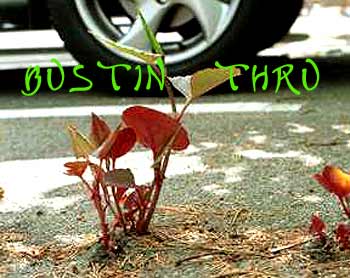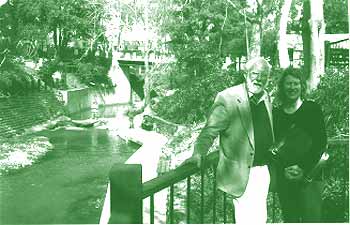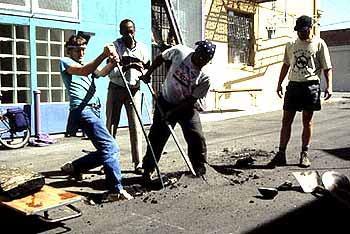|
Earth Day Reality Check:
Depaver Jan's Petroleum Tour

by Jan Lundberg
|
Note: Depaving is a term for taking up the pavement. English speakers commonly do not recognize the word "depave." A radio program in Mendocino County, California, once introduced an album I had recorded as "Songs from a Depraved Driveway." Until the populace knows the word "depave" well, the ecosystem is in trouble and millions of people's survival is in doubt. Toward doing my part I have come close to changing my name from Jan Lundberg to Depaver Jan. It took me until now to realize I can always be Depaver Jan Lundberg. Now, on with the Petroleum Tour! It's "free." - DJL
|
Step out of your door and you're on the Petroleum Tour whether you like it or not.
Even before that, hitting the floor may mean toxic PVC plastic or synthetic carpet for your feet: a petroleum treat. Ignoring the many other instances of petrochemicals that you probably have in the home - in all rooms - and maybe on your body for clothing and in the form of residue from shampoo or deodorant, the most fun of this Petroleum Tour is outside. Are you ready?
Let us venture beyond our doors, painted with petroleum-based paint, to a little appreciated source of petroleum fumes: a shoe store. The Shoe Pavilion in Berkeley, California, on Shattuck Avenue, nearly knocked me back onto the sidewalk when I naively entered in search of some shoelaces earlier this year. I was so repulsed by the overwhelming smell that I preferred the sidewalk even though it's a car-exhaust zone. Perhaps that particular store lacks ventilation. But with good ventilation, the fumes would be polluting the outside world at large.
For my shoelaces I found a cobbler's shop and bought a strip of leather which I cut in two. These laces, though made of exploited cow, are holding up nicely. The cow of course was on a huge "petroleum diet," as readers of Diet for a New America (John Robbins' book) know.
We like to be healthy, so we buy some natural herbal medicines that have been derived (standardized) via petroleum solvents. Or, we are tough cookies and choose to smoke, using a petroleum (butane) lighter. As we throw the cigarette butt in the gutter, some plastic remains in the filter for our beloved environment.
Out on the street one sees nothing but flat surfaces for vehicles and people. The asphalt is not the only example (besides Astroturf) of pavement made of petroleum: concrete's manufacture involves huge amounts of energy (often of petroleum), making it one of the top greenhouse gas sources globally.
What's wrong with pavement? Plenty. At a time when the industrial world's food supply is so vulnerable to collapse - due to over-reliance on dwindling natural gas and oil for growing, irrigating, distributing, packaging and preparing food - we will all soon wish that so much good land for growing crops was not paved over. There is more paved land than official wilderness in the U.S.
The hard pavement hurts our feet and knees and compresses our spinal columns. Some day a class-action lawsuit may be filed against city governments for failing to provide softer, natural walking surfaces. There is a reason that running tracks are of dirt or even petroleum rubber. The damage to our joints and tissues from hard ground and floors is major, preventing many in the middle aged and elderly populations from walking and running to a significant degree. Pavement was designed in part for the human foot, but the human foot was not designed for pavement. On any modern tour, one ought to be sensitive to the hardness of the surface for walking. So on the sidewalks it is best to take advantage of any planted or dirt or gravel area that may afford softness to our feet that may be aching. The flatness is an illusory benefit, and can be counteracted by deliberately walking on any irregular surface such as cracks in the sidewalks or seeds and debris from trees. You'll look crazy or childish, but does your body matter less than the opinions of the unaware, in-car-cerated sheople?

San Luis Obispo Creek, California, downtown.
The creek was daylighted and you can hop across on rocks.
Kirstin Miller of Ecocity Builders is shown with a former mayor of the town.
The U.S. urban and suburban landscape is almost entirely devoted to cars and other motor vehicles. (There are parks, but more area is commonly devoted to asphalted playgrounds of schools.) Although many vehicles are not propelled by petroleum, or have the potential to be propelled by non-petroleum means, petroleum is the reality for almost all vehicles. For besides gasoline, diesel and compressed natural gas, there is the energy for making the cars, the tires, the plastics, and the asphalt they roll on. The latter is from oil, mixed with some gravel and busted glass from the bottles you thought you were recycling.
Trains are an alternative to cars, buses and trucks, but on our Petroleum Tour we must look around in our train car. Except for some steel handrails, window frames and outer doors, every surface is a form of petroleum. On a sleeper train, the sheets and curtains in the cabins are made from polyester, a petroleum product. Even if harmless, such sheets are not soft to the skin. Less than a century ago the train cars contained substantial amounts of wood. And the air in train cars was not, until recent decades, filled with petrochemical molecules from the degrading surfaces of the train car's components. Despite such filth, the average person is fixated still on whether there is any dirt from natural mud, or if there are any superficial stains, rather than if the surfaces of things we touch are contributing such things as deca BDE, the PCB-like flame retardant, into the air for our bodies to take in.
Now for the "fossil fueled free lunch." Drive to a restaurant, sit at a plastic counter as you hold a laminated plastic menu, drink water (pumped most likely by petroleum) in a plastic cup with a plastic straw, and enjoy your meal of foods shipped on the average of 1,500 miles if you are eating in the "Land of the Shopping Spree and the Home of the Slave." James Howard Kunstler, author of Geography of Nowhere, refers to the 3,000 mile caesar salad in the documentary film The End of Suburbia.
Now that we have satiated our bodies and incorporated some petroleum plastics into our bodies due to chemical migration into food and water, it is time to do some more work or divert oneself: Turn on the computer and you touch petroleum plastic, use other petroleum components, and probably rely on the electric grid which warms the globe. (That's okay, because the wonder of science allows us to read the latest studies on global warming on our computers thanks to the amazing Internet.) The cyberworld you enter is a petroleum cage. The poisons associated with the computer industry is a separate topic. We can state generally that the countless poisons derived from petroleum and coal are on the loose with government approval or "regulation." And when non-petroleum chemicals and substances are derived, the catalyst or solvent may be a form of petroleum.
Go to a concert or a rally, and the often petroleum-fueled public address system blasts one's ears to kingdom come, as if we are all hard of hearing. Even churches designed for good acoustics have unnecessary, booming and echoing sound systems. Somehow it is considered necessary whereas several decades ago it was impossible, as masses of people always enjoyed music and speech.
We are all on this Petroleum Tour in most ways, every day of our lives. We are oblivious that our daily support system of petroleum props up our lifestyles and survival - or we pretend otherwise. It is so much more pleasant and popular to think of other things, whether it be the return of a Messiah or the veracity of the latest titillating female celebrity's breasts.
We have all heard of "War for Oil." A Petroleum Tour of Duty is when a God-fearing patriot goes (via jet fuel) to a non-white country to kill and risk getting killed. Nowadays it's in oil-rich Iraq where over 90% of the population has, since soon after the invasion, wanted the invaders out of their country pronto. Upon death, a GI takes two more legs of his or her Petroleum Tour: a plane ride back to the States, where the coffin is prevented from being photographed even by the compliant corporate news media. Then there's the last ride - in a hearse. The family also drives to the cemetery, maybe putting some plastic flowers amidst the petrochemical-treated lawn, and drives home to consume in sorrow some petroleum-derived and delivered foods and drinks. All things considered, is it really enough to question foreign policy and the honesty of a George Bush or the similarly bent John Kerry?
To try not to be on the Petroleum Tour is a challenge. Unless one is in nature, without petroleum-technology, the Petroleum Tour cannot be left behind. It's almost like being caught in The Twilight Zone. But we will all leave behind this near century-long Petroleum Tour when oil supplies become suddenly and seriously short for an extended period. That time could be imminent due to the peaking of global oil supplies, combined with the expected instantaneous market response.
The alternatives to petroleum are not ready on a massive enough scale to permit a seamless transition, whereby the Petroleum Tour is hoped - without foundation - to slide into a Renewable Energy Technofix Tour.
Meanwhile, some of us are living a "boycott petroleum" lifestyle to some extent, or are paving the way to a future without petroleum. Besides eschewing plastic bags and dairy containers as well as soda bottles, some people have no cars and have alternative forms of heat for their homes.
Depaving originated here in Berkeley, by Richard Register of Ecocity Builders. One can thus enjoy a nice park on Halcyon Court in south Berkeley, where one may sit near flowers, where the pavement formerly offered up its lifeless heat. And a creative home-owner on Bonar Street in west Berkeley last summer depaved his driveway and back yard in order to have more garden space.
On Earth Day and every day, such examples of freeing the Earth and ourselves ought to be emulated everywhere. Earth Night would call for guerilla depaving, defended - from dawn's rosy light onward - with civil disobedience.

Berkeley depaving in early 1990s. [courtesy Richard Register, Ecocity Builders]
Why do we grow our own food when we can support the global economy by buying at Safeway or Walmart? One reason is to do some funky recycling. Urine is a most valuable fertilizer for the garden and orchard when diluted and applied as needed. Natural gas is a major component of petrochemical fertilizer. We are all better off without it and without the pesticides made from petroleum as well. Cuba lost its petroleum and had to go organic for agriculture and bicycle-bus oriented for transportation. To combine these sensible approaches happens when one creates pedal-power produce transport.
On a bicycle the rider is using petroleum due mostly to the tires, although some rubber-tree derived tires no doubt exist - they comprised the majority of tires for all vehicles until 1974. Biking involves a tiny fraction of the petroleum dependence that cars represent, although a bike is forced to share the petroleum asphalt with cars. This may be karma, as it was the bicycling League of American Wheelmen over a hundred years ago that forced society to provide pavement. Walking uses only the petroleum-soles of shoes, and is more relaxing than biking which can be stressful for its danger. Biking is the Petroleum Tour On Speed, because one is quickly rolling over hard asphalt that can permanently injure - in an instant - if one unexpectedly meets the ground. Or a petroleum-powered car's door can open right into the rider, even in a bike lane.
In the midst of overpopulation, the "rats in the cage" do their best to remain calm while having to concentrate on their self interest. The requirement of remaining calm - being unable to do anything about the general Babylon situation - takes a toll, and it conditions us to be non-reactive while we slowly boil like the proverbial frog in the slowly heating bucket.
One reason we do not question the Petroleum Tour, i.e., our lives as obedient consumers, is that we have gone to public school for twelve years. In school we were never taught that we were dangerously and unsustainably petroleum dependent, but we were always taught to conform and submit to coercion. Even in the lofty heights of academia, the best universities do not teach that petroleum gluttony is a short-term phenomenon in human history that will be interrupted by chaotic deprivation and die-off.
Nor is the future ecological society of mutual cooperation - based on local resources, local self reliance and local political control - explored or planned in schools or other institutions. The student rats of today don't care much about Petroleum War, until they might be drafted. Until then, they dream of getting a "good job" so as to afford a "nice car." So, aspiring yuppies, "Onward!" with the Petroleum Tour, right off the ecological cliff as motorized lemmings!
-
– Jan Lundberg

This piece was Culture Change Letter #93
Listen to a new interview with Depaver Jan Lundberg on the Steppin' Out of Babylon show, at where Jan has started to conduct interviews as well. Next is the pepperspray torture trial interview series, recorded in mid April in San Francisco.
Ecocity Builders is holding a conference on May 31 in Oakland, Calif., commemorating World Environment Day. Ecocity Builders was founded and is headed by the Depaving Guru: Richard Register.
Pachamama Alliance - helping North Americans help the Amazonian Indians resist oil development by "Awakening the Dreamer, Changing the Dream."
World Rainforest Fund - founded and headed by David Seaborg, evolutionary biologist (see www.suesupriano.com for online interview of Dave by Jan Lundberg)
To recommend Culturechange mailing list to a friend, send this link:
http://lists.mutualaid.org/mailman/listinfo/culturechange
To support the nonprofit Culture Change and its projects, make a donation ONLINE.
To help me promote Culture Change's activities such as the reprinting and circulation online of articles, you may send a donation by visiting
http://www.culturechange.org/funding.htm. Thank you. Keep Culture Change alive. We have no grants or subsidies, only the public's donations.
Jan Lundberg
P.O. Box 4347
Arcata
CA 95518 USA
Tel. 1-215-243-3144
To recommend Culturechange mailing list to a friend, send this link:
http://lists.mutualaid.org/mailman/listinfo/culturechange
If you are interested in receiving Culture Change's e-letter you can sign up to get Culture Change Letter directly, by clicking here: E-Letter
Jan Lundberg, co-founded the Lundberg Letter, called "the bible of the oil industry", in 1973. Mr. Lundberg ran Lundberg Survey Incorporated for the petroleum industry, utilities and government. He founded the Sustainable Energy Institute (SEI) in 1988.
We promote and practice cultural change as key to sustainability. Does economic growth via fossil fuels and materialism provide real security? A sustainable society features car-free living and growing food locally. Communities must return to self-sufficiency for food and energy.
Culture Change and SEI:
P.O. Box 4347
Arcata
California 95518
USA
E-mail: info@culturechange.org
Website: www.CultureChange.org
Published by Sustainable Energy Institute, a nonprofit charity 501(c)(3) California corporation.
To support Culture Change/Sustainable Energy Institute and its projects, make a tax-deductible donation http://www.culturechange.org/funding.htm. Keep Culture Change alive. We have no grants or subsidies, only the public's donations.
|
|



